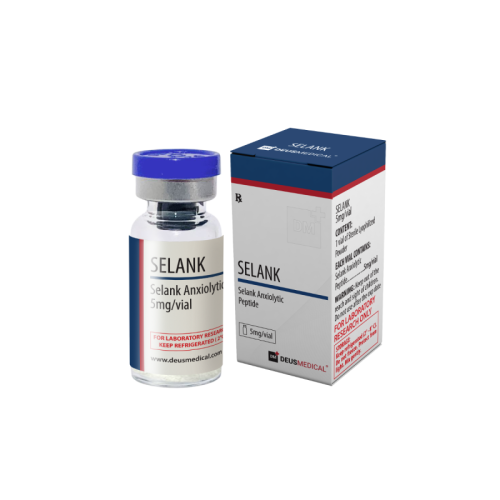CLASSIFICATION
Anxiolytic Peptide
ACNE
No
WATER RETENTION
No
HBR
No
HEPATOTOXICITY
No
AROMATIZATION
No
MANUFACTURER
Deus Medical
LAB TEST
See Document
WAREHOUSE
EU Warehouse 2
SUBSTANCE
Selank Anxiolytic Peptide
,
The recent surge in biotechnology has led to the exploration of new biologically active substances, such as "cognitive enhancers" or "nootropics." One notable compound in this realm is Selank, formerly called “TP-7,” which is classified as a synthetic peptide — a type of small, artificially designed protein.
Selank is promoted as an "anti-anxiety" substance and is also said to aid in learning and boost energy, reportedly without adverse effects or addiction risks. Being much smaller than most natural proteins, Selank was developed by the Institute of Molecular Genetics (Russian Academy of Sciences) in collaboration with the V.V. Zakusov Research Institute of Pharmacology (Russian Academy of Medical Sciences), alongside a related drug known as Semax.
Selank was created by merging the sequence of a peptide named tuftsin with another sequence that enhances its molecular stability. Tuftsin is a naturally occurring peptide that forms part of the antibody IgG. Studies indicate that both tuftsin and Selank can help reduce anxiety and elevate serotonin levels in rats, with Selank showing slightly better efficacy.
In Russia, Selank has been approved for the treatment of generalized anxiety disorder (GAD) and for use as a nootropic, although the FDA has not authorized its use for any conditions. Despite this, Selank is still accessible in various countries, often marketed as a "nutritional supplement."
Mechanism of Action for SelankThe precise mechanisms through which Selank operates are not fully understood, but it is thought to partially stabilize enkephalins in the bloodstream. Enkephalins are natural peptides that may help mitigate the body's stress response. However, one study on mice failed to show enkephalin stabilization post-Selank dosing, and the treated mice did not exhibit notable "anti-anxiety" effects.
According to some cell studies, Selank might interact with GABA receptors, which are typically associated with sedative effects. One mouse study found that treatment with Selank was linked to increased activity in inhibitory neurons that rely on GABA, leading to decreased overall brain activity in a manner consistent with sedation.
Moreover, some researchers have noted an increase in BDNF, a vital neurotropic factor associated with learning and memory, which may explain some of Selank's reported cognitive benefits. Additionally, Selank appears to affect the levels of neurotransmitters—norepinephrine, dopamine, and serotonin—in mice, all of which play roles in motivation, focus, and pleasure.
However, results from one animal study reported that while Selank raised norepinephrine levels, it also lowered dopamine and serotonin levels; conversely, another study indicated Selank increased norepinephrine and dopamine without altering serotonin levels. Thus, Selank's exact effects and mechanisms remain ambiguous.
Potential Benefits: A preliminary clinical trial involving 62 participants suggested that those administered Selank experienced fewer anxiety symptoms, particularly those with existing anxiety disorders. In another study involving 60 patients with anxiety and phobias, similar benefits were observed, lasting up to a week after the final dose. Additionally, in a study with 70 anxiety patients, Selank was found to enhance the effects of phenazepam (an anti-anxiety drug forbidden in some U.S. states due to recreational use) while reducing adverse side effects like drowsiness and memory loss. Animal studies have also shown that Selank can alleviate anxiety in mice, especially those exhibiting higher initial anxiety levels.
AnxietyAlthough there is limited evidence, these findings imply Selank may help alleviate anxiety, though further research is necessary to validate its efficacy and safety in humans. If you struggle with anxiety, consult your doctor to discuss whether Selank could be beneficial for you, but always adhere to your doctor's recommendations rather than substituting them with any supplements.
: Selank was reported to help stabilize memory traces (potentially enhancing memory storage) in rats during a 30-day trial. However, the methodology for assessing memory remains unclear, as memory traces are not distinctly identifiable in the brain. Additionally, one animal study suggested Selank may aid memory preservation in monkeys. Yet, more human studies are required to determine the effects—if any—of Selank on healthy individuals, and its safety for such users is still uncertain, indicating a need for caution until more research is conducted.
Memory: In one study, rats with toxin-induced brain damage treated with Selank reportedly had their brain activity restored to normal.
Recovery from Brain Damage: Selank has been shown to reduce depressive symptoms (as measured by immobility during forced swimming tests) in mice, with lower doses being more effective than higher doses.
Depression: Preliminary animal research indicated that Selank injections raised antioxidant levels in the livers of stressed mice.
Antioxidant Activity in the Liver: One study involving sedated cats found that Selank reduced blood pressure by about 30% for up to three minutes and increased blood flow to the brain by about 24% for up to ten minutes. While these initial findings are intriguing, their relatively short-lived effects complicate interpretation and suggest they may not be clinically significant. Additionally, outcomes observed only in animals raise questions about their applicability to healthy humans.
Blood Flow: Anxiety is a common symptom of alcohol withdrawal. In a study mimicking high alcohol intake, rats that consumed a 10% ethanol solution as their only drinking source for 24 weeks showed decreased anxiety when treated with Selank after a 48-hour withdrawal.
Alcohol Withdrawal: An animal study revealed that rats on a high-fat diet experienced 35% less weight gain with Selank treatment. Furthermore, their total cholesterol levels dropped over 58%, and blood glucose levels decreased by 23.5%.
Weight Gain Prevention and Cholesterol Reduction: In one study, mice with breast cancer treated with Selank had slower tumor growth and lived longer than untreated mice. However, these early findings do not imply that Selank has merit as an anticancer therapy, and further investigation is needed to validate these results for legitimate medical applications. Under no circumstances should conventional cancer treatments be substituted with Selank or any other supplements.
Cancer: Following Selank treatment, the spleens of mice exhibited increased levels of several inflammatory response genes, suggesting some protective effects against inflammation.
Inflammation in the Spleen: Selank has been observed to reduce stomach ulcer size in animal models, potentially due to increased lymph flow—an essential component of the immune system—to the stomach. However, substantial human research is required to verify this effect and its underlying mechanisms.
Ulcers: Selank was reported to raise IL-6 levels in blood cells from patients with depression, with IL-6 being an inflammatory protein implicated in infection defense. Additionally, one cell-based study suggested that Selank could stimulate the release of interferons, which are molecules that combat viral infections. Nevertheless, an animal study involving mice infected with a virus did not demonstrate any antiviral benefits from Selank treatment, raising questions about this proposed application.
Immune Function
